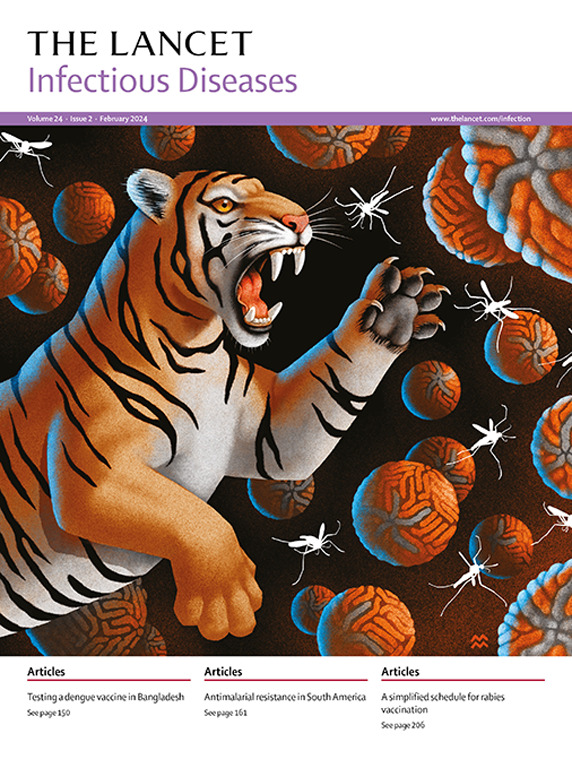Doxycycline to prevent bacterial sexually transmitted infections in the USA: final results from the DoxyPEP multicentre, open-label, randomised controlled trial and open-label extension
IF 36.4
1区 医学
Q1 INFECTIOUS DISEASES
引用次数: 0
Abstract
Background
Doxycycline post-exposure prophylaxis (doxy-PEP) is a promising intervention to reduce bacterial sexually transmitted infections (STIs). We evaluated the effect of doxy-PEP on STI incidence and antimicrobial resistance in men who have sex with men and transgender women for up to 12 months of follow-up, inlcuding an open-label extension.Methods
DoxyPEP, an open-label trial in Seattle (WA, USA) and San Francisco (CA, USA) among men who have sex with men and transgender women with at least one bacterial STI in the past year, randomly assigned participants by clinic (with computer-generated variable block sizes) 2:1 to doxy-PEP (200 mg doxycycline delayed-release tablets 24–72 h after condomless sex) or standard care. The independent endpoint adjudication committee was masked to group assignment. The primary outcome was presence of one or more bacterial STIs (Neisseria gonorrhoeae, Chlamydia trachomatis, or early syphilis) each quarter. This outcome was assessed in the modified intention-to-treat cohort, which included participants with at least one follow-up quarter (ie, ∼3 months) in their as-randomised assignment. After early termination of the randomised phase for efficacy, all participants still enrolled were offered doxy-PEP in an open-label extension (OLE). We report quarterly incidence of bacterial STIs for the as-randomised and OLE periods. Safety was assessed in all participants with any follow-up data. The trial was registered with ClinicalTrials.gov (NCT03980223) and is completed.Findings
From Aug 19, 2020, to May 13, 2022, we enrolled 637 participants; 592 participants completed at least one follow-up quarter in the randomised phase (411 in the doxy-PEP group and 181 in the standard-care group) and 282 in the OLE phase (207 in the doxy-PEP group and 82 in the standard-care group). STIs were present in 129 (12·0%) of 1077 quarters in the doxy-PEP group versus 139 (30·5%) of 455 quarters in the standard-care group during the as-randomised period, showing an absolute difference of 19 percentage points and a relative risk of 0·39 (95% CI 0·31–0·49, p<0·0001). During the OLE, STIs were diagnosed in 51 (13%) of 388 quarters among those continuing doxy-PEP and 25 (17%) of 145 quarters among standard-care participants who initiated doxy-PEP. Throughout all quarters for participants on doxy-PEP, there was one grade 2 laboratory abnormality and five grade 3 adverse events that were possibly or probably related to doxy-PEP. No serious adverse events were attributed by site investigators to doxycycline. Of participants with positive gonorrhoea cultures during the study, eight (27%) of 29 taking doxy-PEP versus five (24%) of 21 not taking doxy-PEP had tetracycline resistance (minimum inhibitory concentration ≥2 μg/mL).Interpretation
Doxy-PEP was effective in reducing bacterial STIs in this population of men who have sex with men and transgender women, including during an open-label extension when doxy-PEP efficacy was known. Doxy-PEP was well tolerated, highly acceptable, and with no new safety signals.Funding
US National Institutes of Health.求助全文
约1分钟内获得全文
求助全文
来源期刊

Lancet Infectious Diseases
医学-传染病学
CiteScore
60.90
自引率
0.70%
发文量
1064
审稿时长
6-12 weeks
期刊介绍:
The Lancet Infectious Diseases was launched in August, 2001, and is a lively monthly journal of original research, review, opinion, and news covering international issues relevant to clinical infectious diseases specialists worldwide.The infectious diseases journal aims to be a world-leading publication, featuring original research that advocates change or sheds light on clinical practices related to infectious diseases. The journal prioritizes articles with the potential to impact clinical practice or influence perspectives. Content covers a wide range of topics, including anti-infective therapy and immunization, bacterial, viral, fungal, and parasitic infections, emerging infectious diseases, HIV/AIDS, malaria, tuberculosis, mycobacterial infections, infection control, infectious diseases epidemiology, neglected tropical diseases, and travel medicine. Informative reviews on any subject linked to infectious diseases and human health are also welcomed.
 求助内容:
求助内容: 应助结果提醒方式:
应助结果提醒方式:


